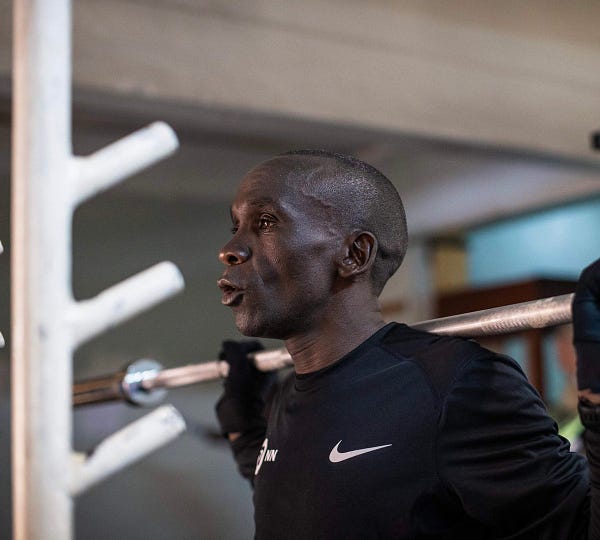Why strength training is vital to boost your running
Improved cardio, reduced fat, better balance - what's not to like?
Slogging away at the gym, lifting weights or whirling kettlebells above your head may not have been what you were dreaming of when you decided running was the sport for you.

But while adding tempo runs, long runs, hills or Fartlek to your training plan will help your speed, endurance and efficiency, it is strength training which so often helps runners reach their goals.
When Running Tales last year wrote about how to avoid injury, running coach Michael Nielsen told us: ““Working on your hamstrings, glutes, quads and core through Pilates and strength training will help you become a better runner.”
With 10 years’ experience as a personal trainer and hundreds of races behind him, Michael is someone worth listening to.
Our own Michelle Lewis, who is a fitness instructor, run leader and personal trainer with 17 marathons to her name, said strength training is vitally important if you’re looking to get fitter and faster.
“As well as improving your running, strength training is also vital in lowering abdominal fat levels, increasing muscle mass, giving your heart a boost and much more,” she said.
How strength training can boost your health - and your running:
Improved cardiovascular health

Low exercise levels and poor diet can lead to fat building up around your vital organs, increasing the risk of cardiovascular disease.
Visceral fat build up leads to the release of proteins and hormones, causing inflammation, damaging your blood vessels and increasing blood pressure.
Fortunately, strength training is a really good way to combat such fat, working to improve cholesterol levels and lower your blood pressure.
Now you can truly run with your heart.
Say goodbye to fat
You might think by running you will be able stay trim, but while it won't do you any harm, strength training is a really important component to seeing off fat.
Studies have found strength exercises are actually more effective at preventing abdominal fat than cardiovascular exercise.
Adding strength training into your exercise regime will not only burn calories, but increase lean muscle mass. This is turn stimulates your metabolism.
Reduction in injuries

A strong muscle base is vital for balance, coordination and movement.
All of these factors are vitally important if you want to improve as a runner.
Step Forward With Lewis and Running Tales’ Michelle Lewis said: “If a muscle is too weak, it puts more stress on connecting tendons.
“Strength training solves this problem, making people less susceptible to injury.”
Boost your mental health
Running is well known for its ability to improve people’s mental health - but strength training also boasts the same lifestyle benefits.
It has even been found to reduce symptoms of clinical depression and anxiety.
As well as boosting endorphins, strength training helps people increase their mental resilience.
And this isn't about lifting huge weights - using low to moderately heavy weights has been shown to have the greatest effects on countering anxiety.
How often should runners do strength training?:

As with most questions of this type in the world of running, the answer is ‘it depends’.
The amount of strength training you need or can do will vary based on what event you are entering, the amount of time you have available during the week, or how far along your running journey you are.
What is definitely true is that even taking part in one strength training session per week will boost you fitness and performance.
Ideally though you should be doing two or three sessions per week, lasting somewhere between half-an-hour and an hour.
Also on Running Tales:
Super Mario - The Ironman who always finishes with a smile on his face
The Great Northampton Run: Revamped half-marathon to celebrate town's heritage and sport
Again, if you’re looking to be an Olympic athlete or take on the Ultra-Trail de Mont-Blanc you may want to reassess those numbers.
However much you decide to do, it’s important to remember not to add so much stress to your body that you get injured.
Runners often have the need to feel the burn, causing them to not only go too fast or too far when out running but to overdo it in the gym.
Before taking any step on your strength training exercise be sure to get the form right.
Some basic strength exercises to boost your running:

It’s important to work your whole body when strength training. As such, there are a whole host of exercises that can bring benefits.
Here we look at four - two lower and two upper body - simple exercises.
Lunges
Lunges - along with squats - are a great way to boost your lower body strength.
Reverse lunges and walking lunges, using dumbbells to add resistance if you want to, use the same muscles you will need when running.
Walking lunges are the best type of lunge for runners as they are a dynamic movement, effectively being an exaggerated form of running.
Lunges also have the benefit of being simple to practice, while they can be done anywhere getting rid of the need for a gym membership or expensive equipment.
Single-leg deadlift
This is another simple but highly effective leg exercise, which really works your glutes.
Single-leg deadlifts will improve your strength, stability and power, conditioning your hamstrings, core muscles and lower back.
Lat pull down
Upper body strength exercises are also really important for runners, not only through the benefits of strong arms helping to propel them forward but by ensuring they have good shoulder strength, and a strong spine and neck.
Lat pull downs will really work your back muscles and shoulders, helping your form and boosting your overall strength.
They are best done on a cable pulley machine, although light weights or a resistance band will also do the trick.
Press ups
The thought of them might make you wince and bring back memories of sadistic school PE teachers, but the humble press up remains a great way to build upper body strength.
They work the triceps, chest and shoulders, improving the core stability that is essential for runners.
A strong core allows for the maintenance of good posture and running form during a run.





